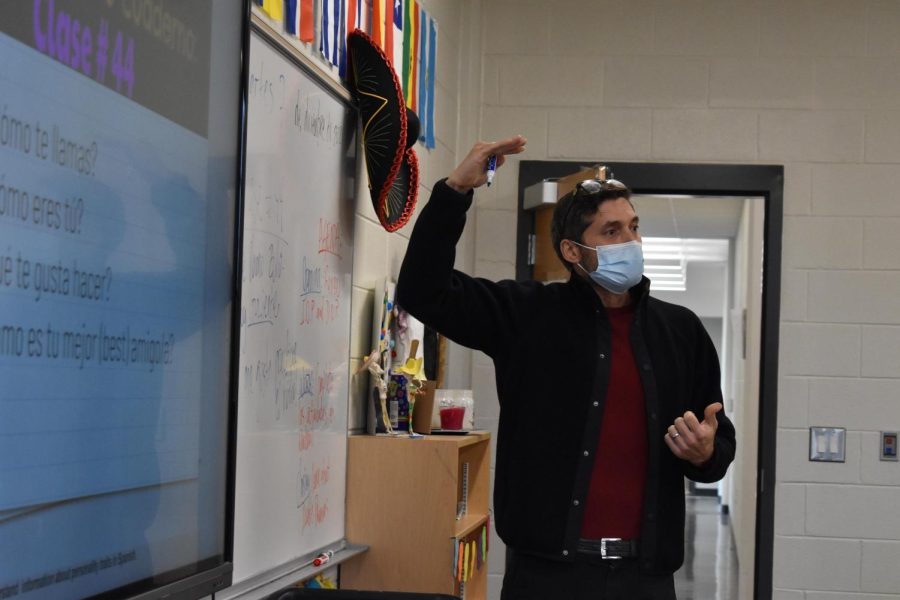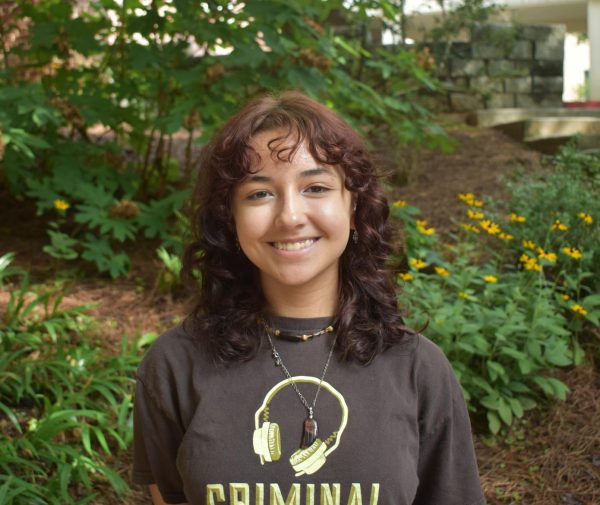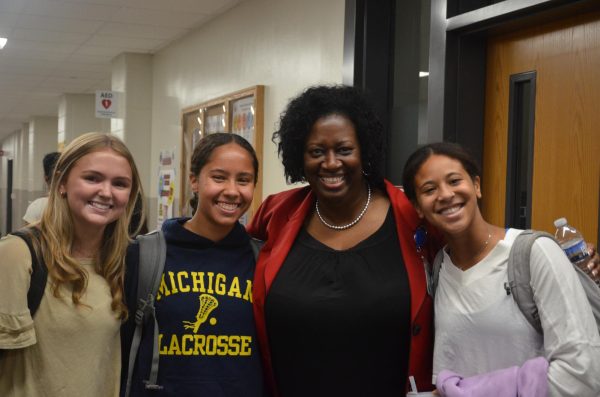Spanish teacher Aquiles Loero provides international insight
Loero begins his class everyday with a few common questions that warm up his students. These questions are intended to provide students with the ability to answer common questions they might experience abroad.
January 12, 2022
For many, traveling the world to pursue a desired lifestyle and career may seem like a dream, but for Spanish teacher Aquiles Loero — this has become a reality.
Loero was born in Venezuela and has spoken Spanish his entire life. While growing up, Loero discovered a developing passion for various languages and cultures, despite the lack of interest from those around him. He moved to the United States in 2010.
“I always felt differently about how I perceived life when I compared myself to my friends and family,” Loero said. “None of them were interested in learning a second language. They would go to school and learn it just for fun, or because it was required.”
In Venezuela, Loero listened to foreign music and watched foreign entertainment — something that was considered to be “uncommon” in his hometown. After realizing his interest for different languages and cultures, he decided to study language in college. This led to Loero’s decision to become a teacher. Since then, he hasn’t looked back.
“I think [Loero] is the most passionate teacher I have,” sophomore Charles Suazo said. “He’s always trying to interact with students, even if they’re not always willing.”
For three summers, Loero studied different languages in Spain. While he primarily focuses on English and French, he is also familiar with Italian and Portuguese. Loero’s university encouraged the celebration of different cultures, despite the language department being small. These celebrations partially influenced his decision to move to the U.S. He wanted to personally experience the cultures he learned about in college.
“We celebrated the big holidays here in the U.S., but it was so different when I moved,” Loero said. “Everything made sense. In some ways it looked superficial because it was only [the language department] that would celebrate. The rest of the university did not do anything about it …When I came here, everything felt like a movie.”
Despite the adventure and excitement that came with moving to a different country, Loreo faced many challenges, including culture shock, language barriers and moving without knowing anyone.
“It’s like you’re in vacation mode,” Loero said. “Everything is beautiful; everything has a really nice taste, and everything’s amazing. Life is like that, but you start missing things eventually. When I experienced culture shock, it was after a year or two.”
While these problems were difficult to overcome, with time, they eventually became easier to manage. Loero’s knowledge of foriegn languages and cultures, along with his passion for teaching and determination to help his students, creates a positive and welcoming learning environment.
“Most of the things he says are in Spanish, but Mr. Loero seems very nice and supportive of people learning and the process of embracing other cultures,” sophomore Adriene Moyer said.
Loero also advises and encourages students to experience different cultures for themselves.
“He’s commented on how different it is to learn a language in a classroom setting versus actually being immersed in it,” sophomore Madeline Brandhorst said.
In helping to immerse students in different cultures, Loero widely promotes resources on study abroad programs to his students. While it is possible to learn a language using a textbook or language class, there are certain parts of a culture that are difficult to master this way, Loero said. The easiest way to get accustomed to accents, slang and vernaculars is by being exposed to local customs.
“Learning about the Southern accent of the U.S. was a little bit challenging to me,” Loero said. “I felt like I had never studied English before … I felt so frustrated because I needed to understand, and I was working so hard … I still remember that kind of shocked me in some way.”
While Loero encourages students to study abroad, he also includes information about different cultures in his lessons.
“Once a week our lesson is not about an actual language, but a Spanish culture tradition such as the ‘Day of the Dead,’” Sauzo said. “We spent a couple of days learning about that and right now, we’re learning about the running of the bulls in Pamplona, Spain. He [Loero] tries to make [class] not just a language, but a cultural immersion.”
As a language educator, the knowledge of different cultures and the experience of living abroad provides students with unique insight of the world.
“I think it is an interesting experience because [international teachers] provide a whole different perspective that you don’t think about sometimes,” sophomore Virginia Laster said. “I think that’s good to have in a school, especially in the U.S. To get an international perspective makes you think about the world in a different way.”
Studying abroad, traveling the world and teaching in a foriegn country causes people to change. However these changes are all positive; they help individuals grow as a person and become more open-minded, Loero said.
“I feel like I am in between. I am not here. I am not there,” Loero said. “It’s just about embracing things. I’ve learned that everything is just fine. If people see you differently, it’s okay. You are different.”













